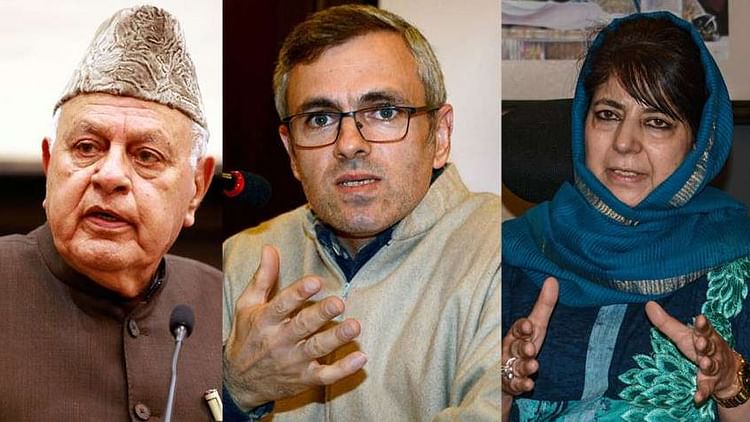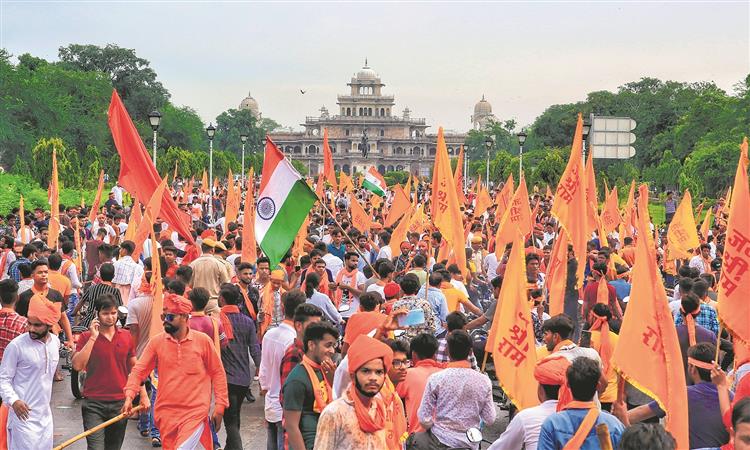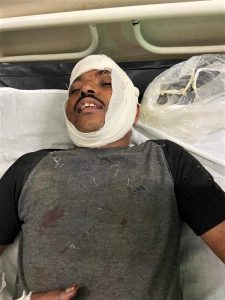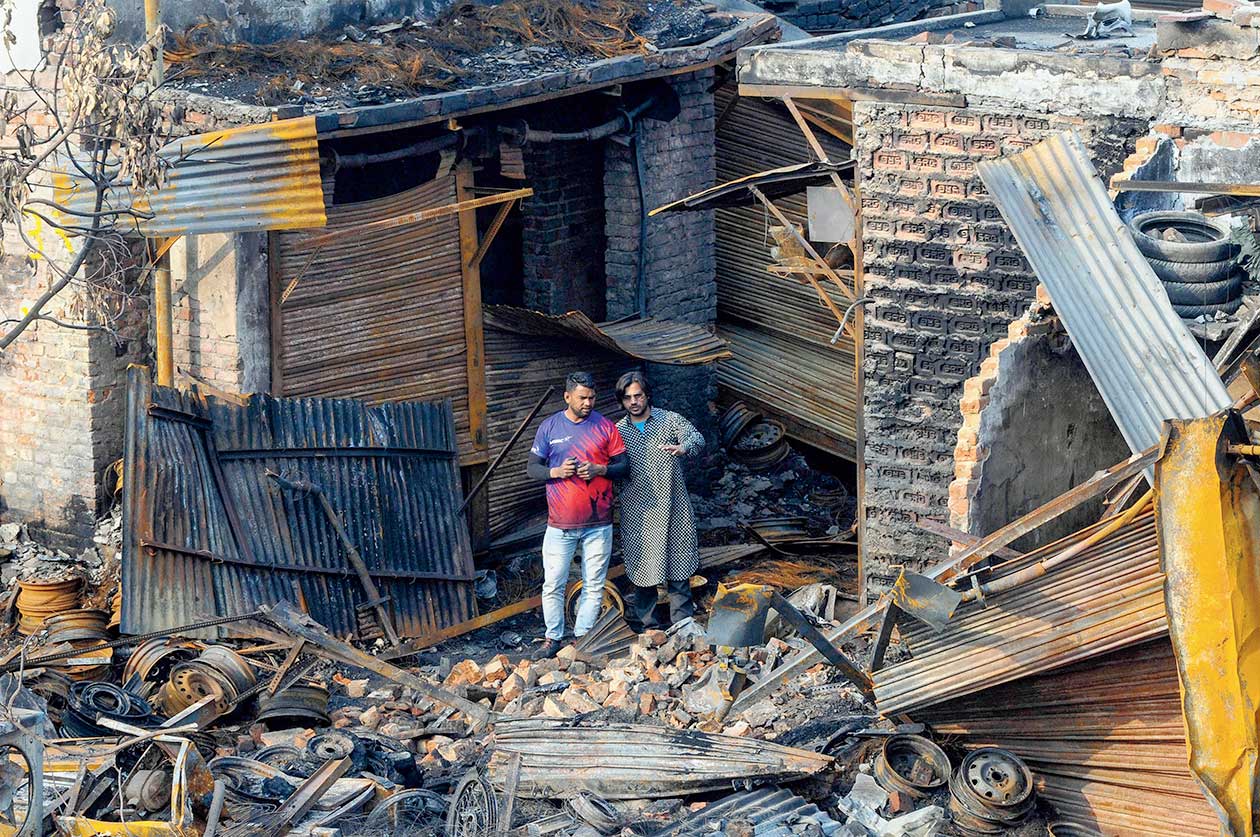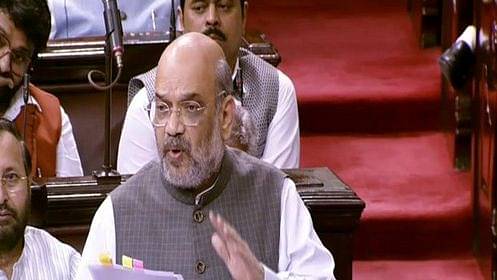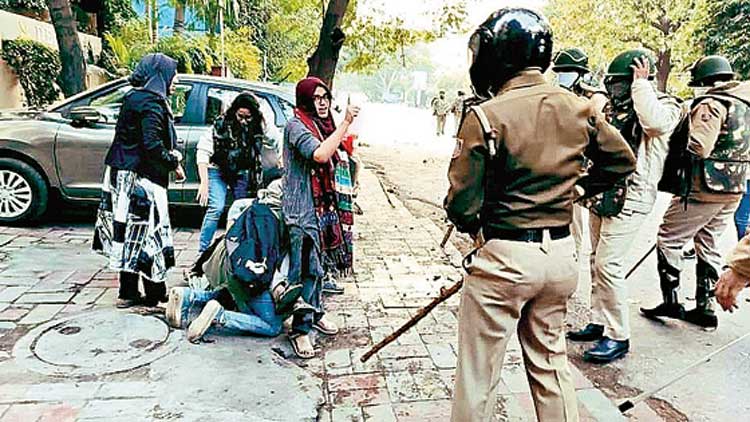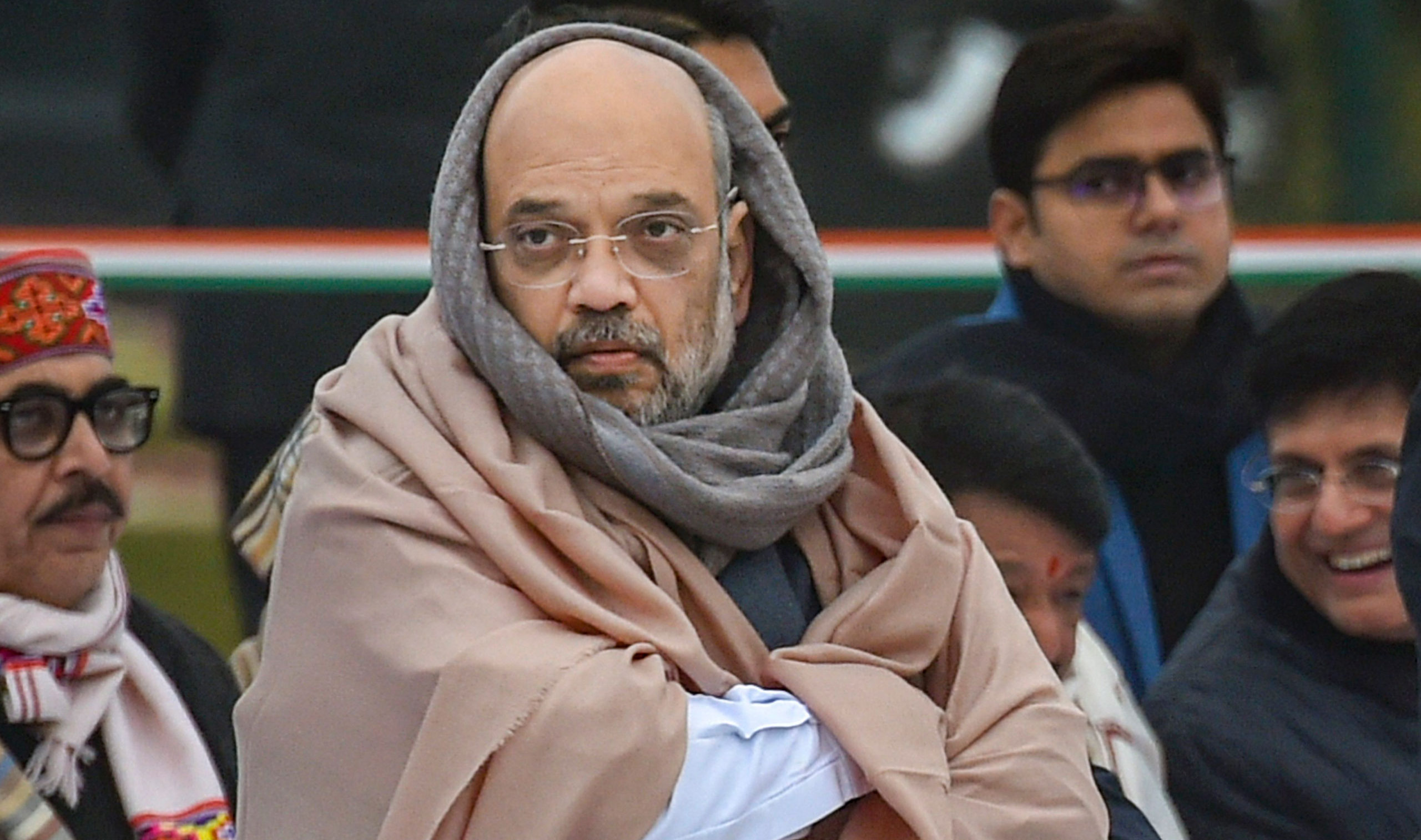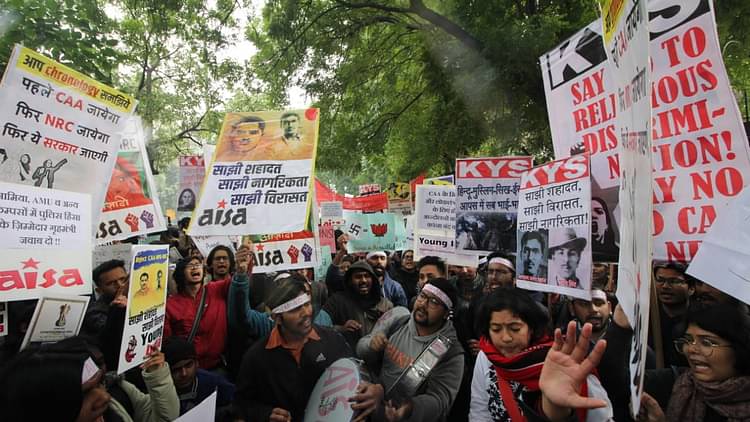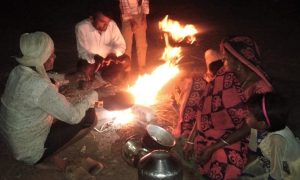Modi govt muzzling democratic dissent : Opposition demands release of 3 former J&K CMs
Sharad Pawar, Mamata Banerjee along with 6 senior opposition leaders have demanded the release of political detainees in Kashmir, especially Farooq Abdullah, Omar Abdullah and Mehbooba Mufti A day after former finance minister of Jammu and Kashmir Altaf Bukhari launched his new regional political outfit JK Apni Party, National Congress Party (NCP) President Sharad Pawar, West Bengal CM Mamata Banerjee along with 6 senior opposition leaders demanded the release of political detainees in Kashmir, especially the three former Chief Ministers of J&K, Farooq Abdullah, Omar Abdullah and Mehbooba Mufti. Sharad Pawar, Mamata Banerjee, HD Deve Gowa, Sitaram Yechury, D Raja, Manoj Kumar Jha, Yashwant Sinha, Arun Shourie have issued a joint statement on Monday in this regard. Slamming the central government, the opposition leaders said, “in the government of Shri Narendra Modi, democratic dissent is being muzzled by coercive administrative action, which has threatened the basic ideals of Justice, Liberty, Equality and Fraternity as enshrined in our Constitution” “Nothing exemplifies this more starkly than the continuing detention, on flimsiest of grounds, of three former Chief Ministers of Jammu & Kashmir — Dr Farooq Abdullah, Shri Omar Abdullah and Smt Mehbooba Mufti — for over seven months. There is nothing in the past records
I grieve for my country as never before
People I have known for ages and counted as my friends are vertically divided. Our only hope of success is that our two great leaders suddenly begin to realise that India with its diversity will be destroyed if they insist on taking the suicidal path they have chosen Today, I grieve for my country as never before! The prospect of a resurgent India, respected in the comity of nations, is slowly fading in the sudden flurry of Hindutva forces yearning for a Hindu Rashtra! Read Also: Great betrayal & abdication, writes Gurbachan JagatPolice failed us again, and nothing much will change, writes Rahul SinghAshis Nandy: It’s very difficult to go back to pre-violent days after you’ve once participated, killed, writes Aditi TandonMedia-manufactured hate in times of riots, writes Pamela PhiliposeKnitting old bonds, writes Ira Pande I remember my first journey beyond Indian shores. It was in the January of 1980 and it was to Japan. On a Sunday morning, I went to church in Tokyo, accompanied by two other guests of the Japanese government. An Indian couple passed us on the road. I exchanged greetings with my countrymen — just a nod and a smile — and this attracted the attention and also the
Christian Leader in Madhya Pradesh, India Run Over by Motorcycles, Sources Say
Violence against Christians in India hit a new level on March 4 when Hindu extremists ran their motorcycles over a key evangelical leader after beating him, sources said. Armed with bamboo rods and a thick metal chain with a heavy lock on it, the 10 Hindu nationalists in Sehore, Madhya Pradesh state beat Isaac Paulose, 48, and then ran their five motorcycles over him, fracturing one of his ribs, said Uttar Kumar Deep, pastor of Grace Fellowship Church, Sehore. Paulose, an elder at the church and Madhya Pradesh coordinator of the New India Evangelistic Association, was attacked shortly after dropping his 5-year-old son off at school that morning, Pastor Deep said. Paulose was in his car when a Hindu nationalist on a motorcycle stopped him and told him to get out, he said. “Unaware of his intentions and without a slightest of suspicion, Isaac stepped out,” Pastor Deep said. “Suddenly others joined the biker, and all of them began to beat Isaac with bamboo logs and a chain.” Paulose’s wife, Elizabeth Isaac, said he was stopped no more than 300 meters from their home. “The moment he stepped out of his car, the others joined in, and they began to beat him,” Isaac said. “Accusing him
Of crime and complicity
THE THIN EDGE: How did we hand over the country to know-nothing, dogmatic reactionaries? After the targeted killings and mayhem started in northeast Delhi, I shared a friend’s post on my Facebook wall: “I have a question for all my friends who believe in this current government. If I can provide irrefutable evidence that this violence was committed by goons egged on by Kapil Mishra and other BJP leaders, and the police was specifically asked to co-operate, would you change your mind? Would you question the communal agenda of the people you voted into power? Because I have evidence. You can decide that enough is enough and call out the people you voted in. Or you can continue to pretend that these are just fringe elements and irritations and the government and the likes of Adityanath and Shah have no communal agenda. It’s getting to the point where you’ll probably have to decide. Because with your active support or tacit consent, these people are tearing the country apart. And this will be on your head. You will have to answer one day.” While I don’t have too many friends who are supporters of the BJP-RSS, a section of my family
Amit Shah in Rajya Sabha contradicts his own Home Ministry’s NPR gazette notification information
No documents mandatory for NPR, no one will be marked doubtful, said Amit Shah. However, the gazette notification is a clear giveaway, Amid concerns expressed by Opposition parties in Parliament and anti-CAA/NRC protesters on the streets about the National Population Register (NPR), Union Home Minister Amit Shah said in Rajya Sabha that no documents would be required to be submitted during the exercise while saying that no one would be marked “doubtful”. However, the "population register" gazette notification by Shah’s own ministry mentions the NPR as the first step towards preparing the NRIC. This is what the Sub-Rule (5) of Rule 3 of the 2003 Rules says: "The Local Register of Indian citizens shall contain details of persons after due verification made from the population register." This is the first step towards NRIC as sub-rule (5) says this would be prepared "after due verification" of the population register. Sub-rule (4) of Rule 4 of the 2003 rules makes it very clear what will happen during this verification and scrutiny process: "During the verification process, particulars of such individuals, whose citizenship is doubtful, shall be entered by the local registrar with the appropriate remark in the population register for further inquiry and in case
Fascim works swiftly, silently
Strong nationalism, xenophobia, 'us versus them' rhetoric are some common features of ultra-right-wing authoritarianism , Ultra-right-wing authoritarianism, as political ideology, is not constructed from any specific world view of human thought and social behaviour. It is a variety of political practice that usually emerges out of a dysfunctional liberal capitalist State, marked by widespread corruption, extreme inequality, and growing economic distress. There are variants of such political practices given the context of the nation where it strikes roots. There are also a few core features that are common across nations. These features are well known: a very strong brand of nationalism along with xenophobia targeted at some ethnic or religious groups. There is the ‘us versus them’ political rhetoric that defines the enemy within the borders of the nation, against whom popular hatred and anger is fomented. The main idea of the nation is created from a mythical and glorious past, to which the nation must return for restoring lost strength and power. This brand of politics revolves round a strong and unrivalled leader who assumes messianic proportions for the purpose of leading the nation into glory. Independent institutions where the ruling order might be questioned or contested are gradually broken up
Amit Shah’s NPR word vs rule
'No document will be sought under the NPR; you are free to give whatever information you want' Amit Shah was responding in the Rajya Sabha to a specific question on the NPR from Congress MP Kapil Sibal during a discussion on the Delhi riots, for which the home minister and the BJP have sought to blame the countrywide protests against the Citizenship (Amendment) Act. Union home minister Amit Shah on Thursday said no one would be marked “doubtful” if they did not provide all the information sought for the preparation of the National Population Register (NPR), adding that no documents needed to be furnished during the process, either. Shah was responding in the Rajya Sabha to a specific question on the NPR from Congress MP Kapil Sibal during a discussion on the Delhi riots, for which the home minister and the BJP have sought to blame the countrywide protests against the Citizenship Amendment Act. “No document will be sought under the NPR. You are free to give whatever information you want. Nobody will be marked a doubtful citizen. No one should be scared of the NPR process,” Shah said amid a volley of questions from the Opposition. The Citizenship (Registration
Now Delhi and Telangana also oppose Modi-Shah’s citizenship ‘Masterstroke’
Modi govt’s various measures on citizenship are running into difficulty. Delhi and Telangana are the latest to oppose the National Register of Citizens and the National Population Register The Narendra Modi government’s various measures on citizenship are running into difficulty. Delhi and Telangana are the latest to oppose the National Register of Citizens (NRC) and the National Population Register (NPR). Considering that Chief Minister Arvind Kejriwal was being seen to be moving close to the BJP by pursuing “soft” Hindutva, the step cannot but upset the BJP. Little wonder that the Union Minister of State for Home, G. Kishan Reddy, has said that Kejriwal is misleading the people. A few days ago, the Bihar government, too, which is a constituent of the BJP-led National Democratic Alliance (NDA), voiced its opposition to the NRC and the NPR unless the latter adhered to the 2010 format. Chief Minister Nitish Kumar’s decision was hailed by his main political rival in the state, Tejashvi Yadav of the Rashtriya Janata Dal (RJD), who said that Union Home Minister Amit Shah had been “pushed back 1,000 km”. There are now 12 states and Union territories which have opposed these proposed legislations. There is little doubt, therefore, that the
Fearing for Children’s Lives, Christian Family in India Refrains from Reporting Assault to Police
Expelled and homeless in jungle, 9-year-old girl is attacked and threatened. Tribal animists in central India drove a Christian family into the jungle last week, with one later intercepting their 9-year-old girl and threatening to kill her if she went to school again, her father said. On Wednesday (March 11), two days after an attack expelling the Christians from Bilood village in Madhya Pradesh state, the wife of the primary assailant stopped the girl (name withheld) as she returned from school to her makeshift refuge in the jungle, her father said. The woman’s husband, identified only as Laxman, had led the March 9 attack on the family of pastor Lalu Kirade, with the assailants later demolishing their home in Khandwa District. “Holding her by her hair, Laxman’s wife asked her how dare she enter the village,” Pastor Kirade said. “[Name withheld] told her that she cannot miss school as her annual examinations are taking place. But Laxman’s wife pulled my daughter’s hair and threatened her that she should not been seen in the village or she would be beaten to death.” His daughter walked back to their jungle site crying the entire way, Pastor Kirade said. “I cried before the Lord for hours, asking
CAA: Reading the UN body’s intervention in Supreme Court | Opinion
The intervention doesn’t touch upon the sovereignty of Parliament. It may be prudent for the SC to allow it, Under the Indian law, the SC is bestowed with fairly wide discretion on whether to allow an intervention. In this context, given the limited nature of intervention — international law implication of the CAA and the status of the HC within the UN system — it may be prudent for the apex court to allow the application of the HC to intervene.(HTPHOTO)ANALYSIS CAA: Reading the UN body’s intervention in Supreme Court | Opinion The intervention doesn’t touch upon the sovereignty of Parliament. It may be prudent for the SC to allow itBy Jay Manoj SanklechaUPDATED ON MAR 16, 2020 12:20 PM IST On March 4, the United Nations High Commissioner for Human Rights, Michelle Bachelet Jeria, filed an intervention in the Supreme Court on the Citizenship (Amendment) Act, 2019 (CAA). She sought to intervene as an amicus in a petition challenging the constitutionality of the CAA. This move raises some interesting questions such as the locus of international law actors to intervene in domestic proceedings, and the extent to which international law influences the interpretation of domestic legal provisions. More generally, the intervention and the government’s





